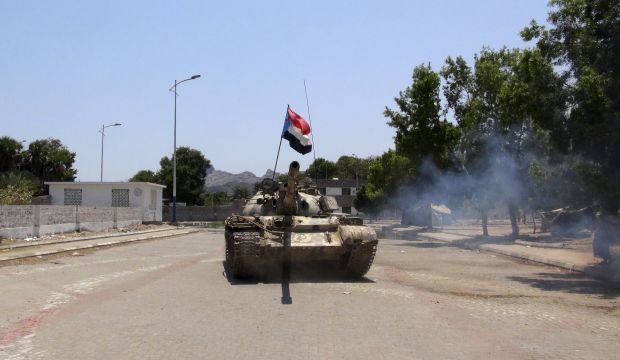So, we have passed “Zero Hour” and the official start of the war against the Houthis in Yemen. This is a war that is taking place with Arab and Gulf participation and amid huge international support. The world united, finally, to support legitimacy in Yemen, standing as one to save Yemen and end the aggression of the Houthi militia, its ally Ali Abdullah Saleh, and their biggest backer: Iran. The drums of war are beating in Yemen, and this has resulted in a deafening echo being heard in Tehran. The war is in the process of returning things to normal, and sending a clear message to Iran: We have had enough of its manipulation and terrorism.
Saudi Arabia and its Arab Gulf allies have never been known as warmongering states. These states were founded, and based on, a policy of taking the long-view and supporting peace, to the point that many believe that they have no other option. But if there is no other option than war, then everybody in the Gulf will rush to defend their homeland and confront the enemy. Riyadh, despite its major differences with the Houthis, opened the door for their participation at the Riyadh Conference; turning a blind eye to their enmity and the war they launched against Saudi Arabia six years ago. Saudi Arabia did so because it prioritizes the interests of the Yemeni people, even if it could have taken a more intransigent approach against the Houthis, and I don’t think anyone could have said anything had it done so. On the other hand the Houthis, adhering to the whims of Tehran, chose to continue their coup by seeking to completely occupy Yemen, eliminating legitimacy as represented by President Abd Rabbuh Mansur Hadi.
We have often repeated that any military intervention in Yemen is not solely Saudi Arabia or the Gulf’s responsibility, but a regional, Arab and international one. The war against terrorism is not a war specific to any country or region. The war against the Shi’ite Houthis or Hezbollah is no different than the war against the terrorism of the Sunni Al-Qaeda or the Islamic State of Iraq and Syria (ISIS). We must also recall that Saudi Arabia coexisted for decades with the moderate Zaydis, which is something that the extremist Houthis could not repeat, as can be seen in their sectarian policies against Yemen’s Sunni community.
When the Houthis launched their aggression on Saudi Arabia’s southern border in 2009, Riyadh demonstrated extreme self-discipline, particularly after it was confronted with a guerrilla war by criminals who made no distinction between soldiers and civilians in the country’s border villages by launching indiscriminate rocket attacks. As a result of this, the Kingdom was forced to readjust its strategy in order to mitigate civilian casualties. As for today, the Houthi militia has usurped the place of the Yemeni military and is portraying itself as capable of defending the nation. But the Houthis are being confronted by an international alliance which is backing legitimacy and rejecting the Houthi coup. The Houthi militia will not be able to stand up to the military strikes that are targeting its forces. No gang can take the place of the state!
As for the Gulf states, they are still pursuing peace and have opened the door for the Houthis to return to dialogue. This is the same door that the Houthis earlier slammed shut when they resorted to the force of arms to impose their coup on Yemen. Responding to this, the Arab Gulf states worked quickly and diligently to mobilize the international community to back a military intervention in Yemen. And when Saudi King Salman Bin Abdulaziz—who met recently with Gulf leaders in Riyadh—gave the signal for the start of aerial operations, the Houthis and their backers Iran were stunned. What was surprising was not just the effectiveness of these decisive airstrikes, but also the unprecedented Arab and international backing for this, and in just a matter of hours.
The Houthis have two options; they must either return to the Gulf Initiative and the outcomes of the Yemeni National Dialogue Conference or face off with an international coalition that will wage a relentless war against them until they are completely uprooted.
